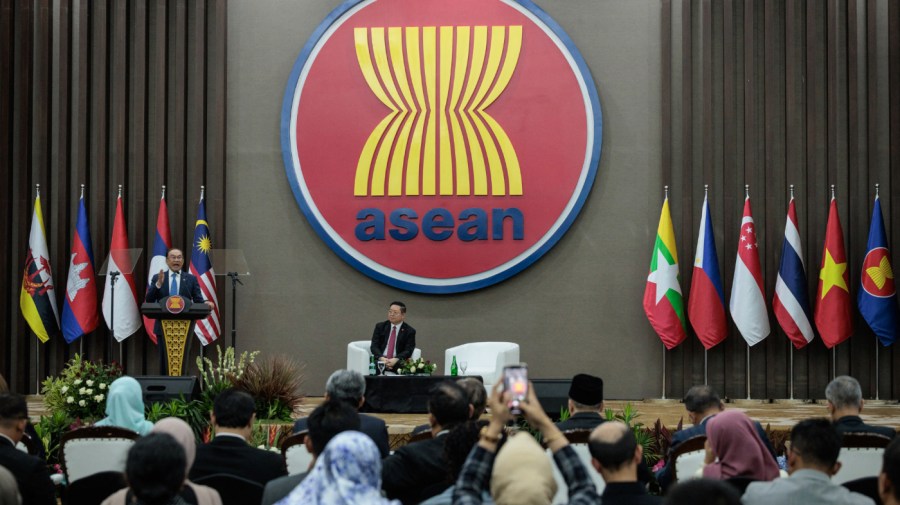World
U.S. Must Expand Investment Beyond Tariffs in ASEAN Region

The United States needs to broaden its approach to trade and investment in Southeast Asia, moving beyond a reliance on tariffs. With a growing emphasis on strengthening partnerships, particularly with the Association of Southeast Asian Nations (ASEAN), the U.S. risks falling behind other nations, such as China and Japan, if it does not actively engage in the region.
During discussions in March 2024, U.S. officials highlighted the importance of viewing ASEAN as a key partner, rather than merely a trade market. This shift in perspective is essential, particularly as global economic dynamics evolve. The U.S. Department of State has acknowledged that while tariffs are a tool for protecting domestic industries, they do not foster long-term economic relationships.
Investing in Southeast Asia offers substantial opportunities for both American businesses and the region itself. ASEAN comprises ten member states, including Indonesia, Malaysia, and Vietnam, and has a combined population of over 650 million. This market presents a significant opportunity for U.S. companies looking to expand their reach and tap into emerging economies.
Reassessing Trade Strategies
The current focus on tariffs has created tensions in international relations, particularly with countries like China, which has been quick to capitalize on the U.S.’s narrow approach. Chinese investments in ASEAN have surged over recent years, allowing China to solidify its influence in the region. As the U.S. contemplates its next steps, it must engage in comprehensive discussions about trade agreements that prioritize mutual benefits and sustainable growth.
President Joe Biden and his administration are tasked with developing a clear economic strategy that emphasizes collaboration with ASEAN. According to recent reports, the U.S. is considering bilateral trade agreements that could enhance economic ties and reduce reliance on tariffs. This shift could position the U.S. as a leader in the region, countering the growing influence of other global powers.
Strengthening partnerships in Southeast Asia is not merely a strategic interest for the U.S.; it also reflects a commitment to shared values such as democracy and human rights. By investing in infrastructure, technology, and education, the U.S. can play a crucial role in the development of these nations while securing its economic interests.
Looking Ahead
As the world becomes increasingly interconnected, countries must prioritize strategic partnerships. The U.S. has a unique opportunity to foster deeper economic connections with ASEAN, but this requires a departure from a tariff-focused mindset.
If the U.S. fails to act decisively, it risks losing ground to nations that are already establishing strong ties with Southeast Asian countries. The potential for growth and collaboration in this region is immense, but it must be approached with a vision that encompasses more than just tariffs.
In conclusion, a renewed focus on investment and partnership with ASEAN can pave the way for a more dynamic and mutually beneficial relationship. The U.S. should seize this moment to engage proactively, shaping a future that embraces collaboration and shared prosperity in Southeast Asia.
-

 Lifestyle5 months ago
Lifestyle5 months agoLibraries Challenge Rising E-Book Costs Amid Growing Demand
-

 Sports4 months ago
Sports4 months agoTyreek Hill Responds to Tua Tagovailoa’s Comments on Team Dynamics
-

 Sports4 months ago
Sports4 months agoLiverpool Secures Agreement to Sign Young Striker Will Wright
-

 Lifestyle4 months ago
Lifestyle4 months agoSave Your Split Tomatoes: Expert Tips for Gardeners
-

 Lifestyle4 months ago
Lifestyle4 months agoPrincess Beatrice’s Daughter Athena Joins Siblings at London Parade
-

 Science4 months ago
Science4 months agoSan Francisco Hosts Unique Contest to Identify “Performative Males”
-

 World4 months ago
World4 months agoWinter Storms Lash New South Wales with Snow, Flood Risks
-

 Science5 months ago
Science5 months agoTrump Administration Moves to Repeal Key Climate Regulation
-

 Business5 months ago
Business5 months agoSoFi Technologies Shares Slip 2% Following Insider Stock Sale
-

 Science5 months ago
Science5 months agoNew Tool Reveals Link Between Horse Coat Condition and Parasites
-

 Sports4 months ago
Sports4 months agoElon Musk Sculpture Travels From Utah to Yosemite National Park
-

 Science5 months ago
Science5 months agoNew Study Confirms Humans Transported Stonehenge Bluestones









